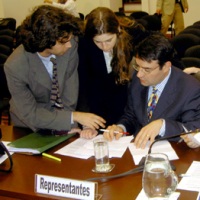Human rights court rules Colombia must pay compensation to family of killed Indian activist
The Inter-American Court of Human Rights ordered Colombia must pay US$232,000 (EUR 168,000) to the family of an Indian activist tortured and killed by army officers in 1988.

The July 4 ruling was made public by the victim's lawyers on Wednesday, a day before the United Nations was set to mark the International Day of the World's Indigenous People.
The judgment, which cannot be appealed, is the seventh in the last two years against Colombia by the Costa Rica-based court, which investigates human rights violations when justice cannot be guaranteed in national courts.
According to the court's sentence, German Escue Zapata was abducted from his reservation home in southwest Colombia by several army officers on Feb. 1, 1988, after an informant told the army he was stockpiling weapons for leftist rebels.
After being beaten with the butt of a gun, he was killed with several gunshots by Capt. Roberto Camacho Riano, commander of a local anti-guerrilla unit, and his body abandoned on a mountain road, according to other officer witnesses.
The court, basing its ruling on a partial government confession, said prosecutors did not fully investigate the killings and ordered the state to pay US$232,000 (EUR 168,000) to Zapata's spouse, parents, six siblings and daughter.
It also ordered the government to continue investigating Camacho and two other officers for the murder, create a US$40,000 (EUR 29,000) fund bearing Zapata's name to invest in public works on the Jambalo reservation and publish a translated copy of the sentence in the Nasa language spoken by Zapata and his tribe.
High-ranking members of the government must also hold a public ceremony on Indian reservation to publicly apologize for the crimes and its slow investigation.
"Unfortunately the ruling is more proof that in Colombia there's total impunity and the only way to obtain justice is by seeking it in international tribunals," said Luis Evelis Andrade, president of Colombia's National Indian Organization.
Colombia's 1.3 million Indians are disproportionately driven from their homes and caught in the crossfire of the country's half-century civil conflict, which is often fought in the rural areas surrounding their ancestral homelands.
According to Andrade, more than 1,500 Indian activists have been killed by the army, leftist rebels or right-wing paramilitary groups in the past 15 years.
Established in 1979, the Inter-American Court's rulings are binding for the 25 Western Hemisphere nations that have submitted to its authority.
Subscribe to Pravda.Ru Telegram channel, Facebook, RSS!





